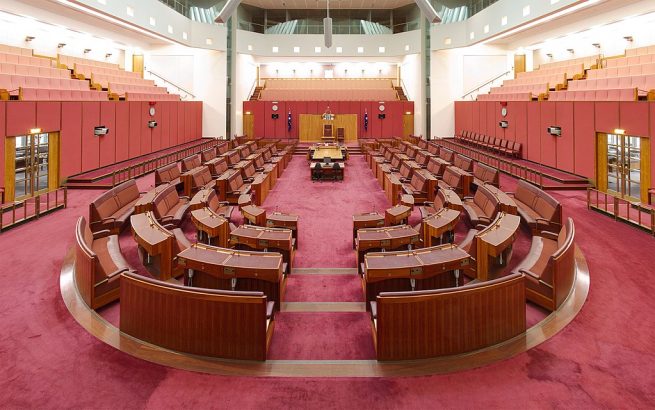Professor Philip Mendes is the Director of the Social Inclusion and Social Policy Research Unit in the Department of Social Work at Monash University.
In October 2024, the Australian Senate’s Legal and Constitutional Affairs Legislation Committee (Upper House of Parliament) released the report of their inquiry into Antisemitism at Australian universities. The Labor Party-controlled inquiry was informed by a Private Members Bill (from Senator Sarah Henderson of the conservative Liberal-National Party Coalition) that proposed a judicial inquiry into Antisemitism at Australian universities to ‘examine incidents of anti-Semitic activity on campus both before and after 7 October 2023’, and so ‘consider whether the response of university leaders, regulators, representative organisation and others has been adequate’ (The Senate 2024: 2).
The inquiry was chaired by Senator Nina Green from the ruling centre-left Australian Labor Party (ALP), and included five other members: Senator Polley from the ALP, Senators Scarr, Reynolds and Henderson from the Coalition, and Senator Faruqi from the progressive Australian Greens. It received a total of 669 submissions: , and held two days of public hearings at which representatives of 24 organisations presented witness statements.
The inquiry recognised the many ‘personal experiences of Antisemitism’ (The Senate 2024: 7) presented by Jewish students and staff as evidenced by multiple examples of racist threats, abuse, harassment, discrimination and hatred. It strongly rejected alternative interpretations of these events as mere instances of ‘discomfort or offense when challenged with differing opinion’, emphasising that ‘victims of Antisemitism’ had experienced genuine ‘fear’ and ‘real harm’. The inquiry also censored universities for adopting ‘woefully inadequate’ responses to manifestations of Antisemitism, and demanded that they take urgent action to create ‘a safe environment’ for all students and staff (The Senate 2024: 54).
However, the inquiry rejected the judicial investigation proposed by the Private Members Bill on the grounds that it ‘would be too slow’ to facilitate necessary change (p.54). Instead, it recommended that all Australian universities ‘review their complaints processes’ to improve outcomes for students and academics, and that the Parliamentary Joint Committee on Human Rights lead a further inquiry into Antisemitism at Australian universities. That additional inquiry has now been established, and will report by March 2025. Leading Jewish community organisations expressed regret that the proposed judicial inquiry will not proceed (Stone 2024).
The content of the submissions (and associated witness statements) to the completed inquiry can arguably be divided into three ideological categories that I have termed anti-racism, blaming the victim, and bystander. These three terms are adapted in part from an earlier report authored by the Federation of Ethnic Communities Councils of Australia and commissioned by the semi-official Australian Human Rights Commission (Muralidharan et al 2024).
Category One is an anti-racist perspective which involves active opposition to ‘racist policies, practices, culture and ideas’. It is not merely an in-principle or theoretical opposition to Antisemitism and other forms of racism, rather it requires the activation of ‘strengths-based’ trauma-informed strategies that enable people to feel ‘physical, psychological and emotional safety’ in order to ‘promote racial equity’. This approach usually requires extensive consultation with the lived experience stories of those groups affected by racism (Muralidharan et al 2024: 2).
Category Two is a blaming the victim viewpoint which includes varied forms of institutional and interpersonal racism including internalised racism. Institutional racism occurs when organisations tolerate Antisemitism and other forms of racism as normalised behaviour. Interpersonal racism can ‘take the form of abuse, harassment, humiliation or exclusion’, and can include anything from jokes to overt discrimination. What matters is not the intent of the perpetrator, but rather the level of distress caused to the target (Muralidharan et al 2024).
Internalised racism refers to members of minority groups who internalise the prejudices of the wider majority culture, and ‘promote racist attitudes, beliefs or ideologies directed at their race or cultural group’ (Muralidharan et al 2024: 2). Given the long history of Antisemitism encompassing multiple religions, cultures and political ideologies across both Global North and Global South countries, it is not surprising that some Jews may internalise Antisemitic assumptions. This will be evident in the analysis of the views of Jewish anti-Zionist groups that follows.
Category Three is what I have called elsewhere the Bystander approach whereby proponents claim to oppose Antisemitism, but allocate little if any time or resources to actively combat Antisemitism. Whatever their motivations and beliefs, they end up sitting on the fence half way between the perpetrators and victims of Antisemitism (Mendes 2024).
Inquiry submissions and presentations
I have chosen to highlight a small number of examples of all three categories. In most cases, these organisations presented both written submissions and witness statements to the inquiry.
Category One: Taking anti-racist action against Antisemitism
The majority of submissions supported the proposal for a judicial inquiry, and can reasonably be described as representing anti-racist viewpoints. A total of 420 of the 669 submissions were marked as ‘confidential’ or ‘name withheld’ which suggests a high level of ‘fear in the Jewish community’ concerning the potential ramifications of reporting experiences of Antisemitism (The Senate 2024: 64).
David Slucki, the Director of the Australian Centre for Jewish Civilisation at Monash University, noted in his witness statement that multiple research studies had found ‘a rapidly growing number of Jewish students and staff reporting that they feel marginalised or unsafe’ (p.24). He added that what mattered regarding some inflammatory pro-Palestinian slogans was not their meaning or intent which could be ambiguous, but rather their ‘harmful impact’ on Jewish students and staff (p.26). In his Submission (124), he argued that academic freedom was not unlimited, particularly when it resulted in cases of ‘Antisemitic abuse and harassment on campuses’ (p.2).
The submissions from the Special Envoy to combat Antisemitism (hereafter The Envoy), the Australian Academic Alliance Against Antisemitism (hereafter 5A), and the Australasian Union of Jewish Students (AUJS) all presented substantial lived experience narratives from Jewish students and/or academics afflicted by Antisemitism.
The Envoy (Submission 422) presented the findings of a study based on interviews with 65 Jewish university staff, students and academics from campuses across Australia. The sample reported lived experiences of overt racial vilification leaving them feeling ‘offended, humiliated, insulted and intimidated’ (Appendix 3, p.5). A number experienced associated trauma, depression, anxiety and stress.
The 5A (Submission 603) presented the preliminary findings of a survey of 390 students and 200 university staff (total 590). It stated that a majority of those surveyed did ‘not feel safe in the university environment’. In particular, a majority of Jewish students reported feeling ‘fearful and intimidated’. One particular case presented in their witness statement involved that of Professor Steven Prawer, a University of Melbourne academic who leads a doctoral exchange program with the Hebrew University of Jerusalem. Prawer was racially harassed for a number of months by a group called Students Against War who distributed posters accusing him of genocide, held a protest rally outside his office building, and later (post the inquiry hearing) in October 2024 invaded his office to intimidate and threaten him (Hill 2024).
The AUJS (Submission) reported 13 vignettes of student lived experiences of Antisemitism including ‘verbal abuse, hostile rhetoric, physical threats and discriminatory actions’. AUJS opined that these incidents had left Jewish students ‘feeling unsafe, ostracized and targeted for their identity’ (p.12).
All the anti-racist submissions and witness statements (e.g. the Envoy) argued that Antisemitism was a unique form of racism, which in order to be combatted effectively, required a specialised response separate to more general anti-racist frameworks. Most also supported the proposal for a judicial inquiry on the following grounds: It would enable victims of Antisemitism to give evidence in camera and hence protect them from potential retribution as a result of presenting their testimony; and it would compel witnesses to give evidence and provide documents on how universities had responded to Antisemitism on campus (The Senate 2024: 26-29).
The anti-racist submissions and concerns were strongly supported by the Dissenting Report from Liberal-National Coalition Senators which highlighted the major fears presented by Jewish students and staff concerning their safety and wellbeing in favour of a judicial Commission of Inquiry (The Senate 2024: 57-68).
Category Two: Blaming the victim
A much smaller number of blaming the victim submissions attempted to deny or minimise manifestations of Antisemitism in universities, failed to engage with Jewish lived experiences of prejudice, conflated perpetrators and victims of Antisemitism, and opposed any specific action to combat Antisemitism.
Three examples of this viewpoint were Muslim Votes Matter (MVM), Australian Palestine Advocacy Network (APAN), and the Jewish Council of Australia (JCA). MVM (Submission 141) denied that there was any evidence – despite the extensive data from consultations with Jewish students and academics cited in Category One above – that Antisemitic ‘incidents within academic settings are more prevalent or severe than incidents of Islamophobia or anti-Palestinian racism’ (p.10). They framed any such incidents as merely involving what they termed ‘legitimate’ pro-Palestinian political discourse, rather than hate speech. In their witness statement, they argued that anti-Zionist activism never converged with genuine Antisemitism (p.47) despite the fact that pro-Palestinian campaigns have regularly used racist slogans to attack Australian Jews. The MVM did not engage at all with Jewish lived experience narratives, and instead demanded that the inquiry prioritise engagement with other groups such as Muslims and Palestinians that were ‘potentially impacted’ by the Bill (p.12).
Similarly, the APAN (Submission 131) denied the sincerity of Jewish lived experience voices, arguing instead without any evidence that ‘subjective feelings of discomfort or unease’ were ‘being wrongly equated with objective threats to physical safety, often leading to false accusations of Antisemitism’ (cited in The Senate 2024: 13).
The JCA (Submission 181) was one of seven submissions from Jewish anti-Zionist groups, the others being Submissions 67, 96, 104, 127, 159, and 607. These Jewish groups implied that Antisemitism was almost solely a product of the far Right and never associated with pro-Palestinian protests. Regardless, it was in their opinion an insignificant phenomenon compared to the allegedly larger forms of discrimination directed against other cultural and religious groups.
The JCA was the only organisation in that cohort invited to present at the public hearing. They did not engage with any Jewish lived experience voices of Antisemitism, and belittled such experiences as merely reflecting what they termed ‘subjective fear’ or ‘discomfort’ (p.13). According to the JCA witness statement, Jewish students were wrongly misinterpreting legitimate challenges to their political views as racial discrimination (p.19). Yet ‘everyday’ attacks on culture and identity have been identified by Muralidharan et al’s above study (2024: 2) as constituting a form of ‘interpersonal racism’ that can have a significantly adverse impact on those targeted. The JCA opposed any specific action to combat Antisemitism on the grounds that it would unfairly limit the free speech of those advocating for Palestinian national rights. In essence, they were arguing that a committed anti-Zionist could not be a robust opponent of Antisemitism.
This blaming the victim perspective was defended by the Australian Greens who argued against any further inquiry into Antisemitism at all. Praising the statements by the JCA and other Jewish anti-Zionist groups, they argued that concerns about Antisemitism were falsely invented by the Coalition to undermine campaigns in favour of Palestinian national rights. According to Senator Mehreen Faruqi who did not attend the public hearings, ‘The intention of this Bill is not to tackle racism, but to weaponise the discourse surrounding racism, and Antisemitism in particular, to target legitimate criticism of the State of Israel and its genocide of the Palestinian people’ (The Senate 2024: 71).
Category Three: The Bystander approach
The National Tertiary Education Union (NTEU, submission 122), a trade union with 28,000 members seemed to be the prime example of bystander views. The NTEU is divided between a small moderate group of mostly national officials who support a two-state solution, and a larger group of university branch representatives (many aligned with the fringe Left Socialist Alliance) who favour the elimination of Israel and its replacement by an exclusivist Arab state of Greater Palestine (Strauss & Panegyres 2024; Winter 2024). That zealous majority pressured the NTEU at its October 2024 national conference (via a decisive vote of 84-16) to adopt an extremist motion in favour of the global Boycott, Divestment and Sanctions (BDS) movement’s demand for an academic boycott of Israeli universities and researchers (Chidiac 2024).
Although the NTEU opposed the proposed Private Members Bill, they do unequivocally condemn Antisemitism. But they oddly did not engage (via their Submission) with any of the lived experience narratives of their Jewish members, and have taken no action whatsoever to oppose Antisemitism within their membership or within universities more generally. They insist they have received no reports or complaints from members ‘about acts of Antisemitism’ (p.56). The NTEU claim that they have no power to influence the behaviour of individual members acting outside their specific union activity, but in fact some official NTEU branch delegates (for example at the University of Melbourne) seem to have actively participated in a public rally that targeted a Jewish academic, Professor Steven Prawer (McNamara 2024). There is no evidence that the NTEU has dissassociated itself from those Antisemitic activities, or that they have offered any anti-racist solidarity to Professor Prawer.
In their witness statement, the NTEU admitted a total of 53 members (it is unclear whether or not they are all Jews as the NTEU don’t collect information on the ‘religious affiliations’ of their members) had resigned from the union since October 2023 due to its perceived failure to unequivocally condemn the Hamas death squad massacre, and associated concerns that the Union may be Antisemitic. They added (additional Submission 603) that four members had also resigned due to the NTEU not being sufficiently supportive of the BDS movement and/or Hamas’s massacre. This seemed to be an unfortunate construction of pro-racist and anti-racist perspectives as representing two extremes with the NTEU sitting half way between them in the middle.
What can be done to prevent the institutional entrenchment of an Antisemitic movement within Australian academia?
It is evident from the parliamentary inquiry that a significant minority of Australian academics hold anti-Zionist fundamentalist views. That is, they share the views of the global BDS movement that all Israeli Jews are evil oppressors. Consequently, they favour the elimination of the Jewish State of Israel and its replacement by an exclusivist Arab state of Greater Palestine in which Jews would be allowed to remain at best as a tolerated religious minority with no national or cultural rights.
A smaller sub-section of zealots within this cohort appear to be overt bigots who frame all Australian Jews who support Israel as a political enemy that should be excluded from public discourse (Winter 2024). In short, their political anti-Zionism and traditional racist Antisemitism closely converge via their demand that Jews be denied equal rights of citizenship. This group are dedicated to propagating hate speech within their existing teaching and research activities, and so indoctrinating undergraduate and postgraduate student cohorts in order to create an inter-generational Antisemitic movement.
They demand that the voices of perpetrators rather than victims of Antisemitism be privileged, and aggressively reject any attempts by universities and other institutions such as government to limit their freedom to promote hate speech. In other words, they defend (to paraphrase a former Australian Liberal-National Coalition government Attorney General George Brandis) their ‘right to be bigots’ (cited in Chan 2014). A good example of such behaviour is the recent group letter signed by over 120 University of Melbourne staff defending the Antisemitic mob that invaded Professor Prawer’s office (see details above), and insisting that such racist ‘protest actions’ be protected as ‘legitimate student activism’ (University of Melbourne Staff 2024).
What effective action can be taken to protect Jewish Australians from hate speech at universities? Anti-racist education and training (Muralidharan 2024: 21) can definitely play a role in educating students and academics about the long history of Antisemitism across varied religions, cultures and political regimes including, for example, the Nazi Holocaust, Stalin’s war against Soviet Bloc Jews from 1948-53, and the mass ethnic cleansing of more than 800,000 Jews from the Arab and North African countries in the decade or so after Israel’s creation (Mendes 2024); the persistence of Antisemitic tropes claiming Jews control politics, the media, finance and world events; the traumatic impact of Antisemitic hatred on Jewish students and academics; and the differences between legitimate criticism of Israeli government actions and the essentialising of all Israeli and other pro-Israel Jews as an evil collective (The Senate 2024: 52-53).
But scholarly evidence alone is unlikely to persuade the bigoted perpetrators discussed above to cease their hate speech. The challenge facing the forthcoming second parliamentary inquiry into Antisemitism is to ascertain whether governments and/or universities need to place specific institutional limits on academic freedom in order to prevent the unfettered promotion of the oldest form of hatred. The recently announced class action racial vilification suit against alleged perpetrators at the University of Sydney (Yim 2024) suggests an alternate legal approach that may prove more effective in preventing entrenched racial discrimination in universities.
References
Chan, G. (2014) George Brandis: People have the right to be bigots. Guardian Australia, 24 March. https://www.theguardian.com/world/2014/mar/24/george-brandis-people-have-the-right-to-be-bigots.
Chidiac, V. (2024) NTEU National Council passes motion supporting institutional academic boycott of Israel. Honi Soit, 5 October. https://honisoit.com/2024/10/nteu-national-council-passes-motion-supporting-institutional-academic-boycott-of-israel/.
Hill, B. (2024) ‘Jewish academic’s office occupied by demonstrators’. Australian Jewish News, 18 October. https://www.australianjewishnews.com/jewish-academics-office-occupied-by-demonstrators/.
McNamara, O. (2024) ‘Melb Uni students rally to cut ties with Israeli university’. Solidarity, 2 October. https://solidarity.net.au/highlights/melb-uni-students-rally-to-cut-ties-with-israeli-university/.
Mendes, P. (2024) ‘Why progressives are failing on contemporary antisemitism’. The Jewish Independent, 18 July. https://thejewishindependent.com.au/why-progressives-are-failing-on-contemporary-antisemitism.
Muralidharan, P., Hosseini, Y., & Arashiro, Z. (2024) An anti-racism framework: Experiences and perspectives of multicultural Australia. Federation of Ethnic Communities Council of Australia. https://humanrights.gov.au/sites/default/files/document/publication/an_anti-racism_framework_community_consultations_report.pdf.
Stone, D. (2024) Senate Committee rejects judicial inquiry into university antisemitism. The Jewish Independent, 7 October. https://thejewishindependent.com.au/senate-committee-rejects-judicial-inquiry-into-university-antisemitism.
Strauss, J., & Panegyres, M. (2024) NTEU endorses boycott, divestment and sanctions on Israel, prepares to grow. Green Left Weekly, 17 October. https://www.greenleft.org.au/content/nteu-endorses-boycott-divestment-and-sanctions-israel-prepares-grow.
The Senate Legal and Constitutional Affairs Legislation Committee (2024) Commission of Inquiry into Antisemitism at Australian Universities Bill 2024 (No.2). Commonwealth of Australia. https://www.aph.gov.au/Parliamentary_Business/Committees/Senate/Legal_and_Constitutional_Affairs/AntisemitismBill/Report.
University of Melbourne Concerned Staff (2024) UniMelb staff statement on the right of protest and academic freedoms. Overland online, 22 October. https://overland.org.au/2024/10/unimelb-staff-statement-on-the-right-of-protest-and-academic-freedoms/.
Winter, B. (2024) Antisemitism in our hallowed halls. Substack, 7 October. https://bronwyndrw.substack.com/p/antisemitism-in-our-hallowed-halls.




































